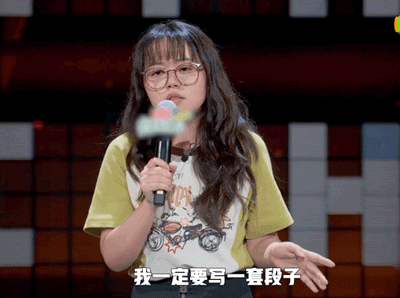
In China’s New Stand-up Comedy Shows, Women Have All the Best Lines
Stand-up comedy is finally back on China’s TV screens after a yearlong absence — and a new generation of performers has come out swinging.
The scene went into a deep freeze last May following controversy over a joke by a comic at a Beijing show, which led to stand up disappearing from the airwaves for over a year.
But the industry is now making a comeback, with the major Chinese streamers iQiyi and Tencent Video launching new weekly stand-up comedy shows in August. Both have sparked a huge reaction on social media.
In particular, the shows are giving a platform to a new generation of female comedians, who are making waves by addressing a range of women’s issues in their sets — from period shaming to gender bias.
The prominence of female comics in these new shows is unprecedented. There are 27 women competing in the two contests in total, accounting for nearly one-third of the total performers.
It’s a stark contrast with just a few years ago, when pioneering female stars like Yang Li, Siwen, and Li Xueqin were massively outnumbered.
For a long time, the stand-up scene in China — as in many other countries — was a male-dominated space, and the first generation of female comics often faced intense backlash.
Yang in particular became notorious for joking in a 2020 show about how some men “look so average, yet act so confident.” Fellow comedian Mengga was also subjected to a wave of slut-shaming after sharing onstage that she’d been infected with human papillomavirus, or HPV.

But China’s female comics have refused to back down. The debutants on this year’s shows are, if anything, even more outspoken than Yang, with many taking bold stances on a string of hot-button gender issues in their sets.
A comic known by the stage name Caicai has generated controversy by discussing her experiences with menstruation and buying sanitary pads, propelling the topic “period shaming” to the top of trending lists on Chinese social platforms.
In one routine, Caicai recalled asking a delivery rider to help her buy some sanitary pads after her period came late one evening. But the rider was so embarrassed by the interaction that he refused to say the word “sanitary pad,” instead using the code word “that thing” throughout the conversation.
According to Caicai, the man told her at one point: “If I’d known, I would’ve taken a job delivering bottled water instead.”
One of the show’s female judges, Chen Luyu, also attracted attention with a heartfelt monologue about the power of culture to drive social change.
“Language changes actions, and actions change all our ways of thinking,” Chen said. “When we realize that this issue can receive support in public spaces, people’s mindsets will gradually begin to change.”
Other comics touched on the deep-seated gender bias that still pervades many parts of society. A young stand-up named Echo discussed the discrimination she faced as a girl growing up in a rural area.
“There were three types of kids who didn’t get hit: those that did well at school, other people’s kids, and sons,” she said. “In our family, we had to work really hard to look like we were doing things as effortlessly as the boys.”

The comedian Yarong, meanwhile, reflected on how her experience living and working overseas became a disadvantage when she returned to China and started dating. Many of her matches just wanted to find a woman who would stay at home and raise their children, she said.
“They believed a woman like me wasn’t family-oriented, and was unreliable,” she said.
These routines have divided opinion on social media. Many netizens have criticized the female comics for focusing narrowly on women’s issues, arguing that they should instead try to appeal to a “wider audience.”
But many others disagree. Jiao Junpeng, a 21-year-old from the southwestern city of Chengdu, told Sixth Tone that every comedian should be allowed to play to their own strengths.
“It’s perfectly fine for female comedians to address their own struggles,” he said. “If male stand-ups like Xu Zhisheng can repeatedly joke about his appearance, female comedians can also discuss women’s issues over and over. Each performance is different; even if the theme is the same, the punch lines vary.”
Younger female viewers, meanwhile, have often found the performances genuinely eye-opening. Mao Yuyang, a 25-year-old from the eastern Zhejiang province, said that she’d learned a huge amount from watching female stand-up comedians perform.
In particular, Mao said that Caicai’s routine had made her realize that period shaming is ultimately a form of social discrimination that she didn’t need to accept. “It made me understand that there’s no need to feel embarrassed,” she said.
Mao added that she hoped that women would continue to get more opportunities in stand-up comedy.
“More female comedians mean more discussions about women’s struggles and issues,” she said. “We may not like every performance from a particular comedian, but her presence alone is significant.”
(Header image: Visuals from @脱口秀和Ta的朋友们 and @爱奇艺喜剧之王单口季 on Weibo, reedited by Sixth Tone)










